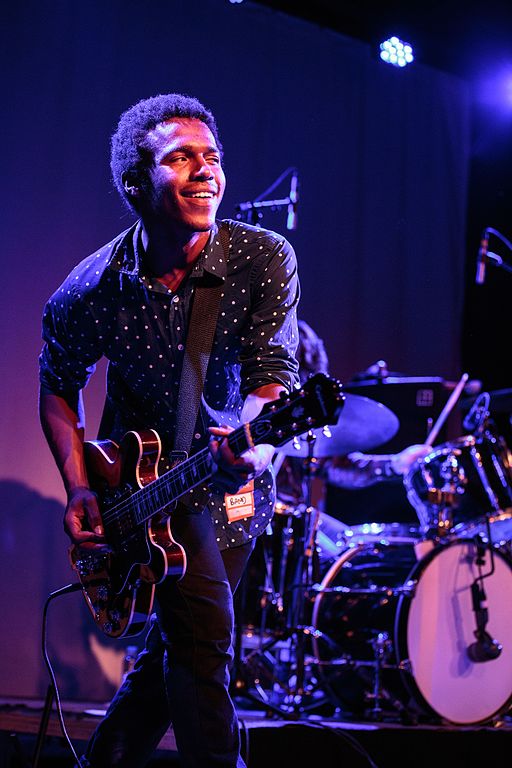Artist profile of musician Benjamin Booker whose sounds is reminiscent of 1960’s music and the Civil Right’s Movement
For how down-to-earth and relatable of a man he is, Benjamin Booker’s music is pleasantly difficult to pin down. He was raised on punk and influenced by twentieth century R&B. His sound is a rich and energetic fusion of blues, hard rock, gospel, folk, and everything in between. The one constant in his music, however, is its power. His signature hushed vocal style paired with vibrant instrumentals makes for deliveries that are as timeless as they are poignant. This effect is fully realized on his 2017 album, Witness, a stirring project that rallies for social change with humble sophistication. Although it’s significantly more cerebral, it matches the energy of his more brazen self-titled debut Benjamin Booker.
Now with two respectable albums under his belt a distinct, captivating sound, Benjamin Booker’s future looks abundant with potential. In addition to his roots and influences in getting to this point, credit also is due to the 31-year-old’s honesty and tenacity.
Before Music
Benjamin Booker was born as Benjamin Evans in Virginia Beach, Virginia. However, Booker raised largely in Tampa, Florida. In Tampa, the songwriter would be exposed to much of his future artistic influences- most notably his musical sound and his experience with social injustice. One of his first experiences with the latter was when he was transferred to a school far from his less well-off neighborhood. Entering an environment that hosted kids on opposite sides of the economic spectrum made him feel out of place. This was a recurring theme in his time spent living in the south.
Long before he found any catharsis in music, Booker took up skating . It was through this community that Booker was first exposed to punk music. He attended D.I.Y shows at the Transitions Art Gallery, listened to his schoolmates’ bands, and reveled in the music of This Bike Is A Pipe Bomb and Paul Baribeau. The genre played an important role in his progression as a person and an artist.
This interest in punk continued into Booker’s young adult years. He began studying journalism at the University of Florida in Gainesville, a college town that has earned its reputation as a hub for punk music in the south. Unfortunately, just as his music followed him, so too did prejudice. Booker would experience it firsthand as he was pulled over by police without justification on several occasions. He sometimes had a sense of security by being able to cite his position as a journalist. However, this ability to “outsmart racism” never lasted long, especially with more exposure to situations like that of Trayvon Martin.

Tim Bugbee / tinnitus photography via digboston & Wikimedia Commons
Start of Music Career
After graduating in 2012, he failed to get hired by NPR and Rolling Stone . Ironically, both publications would be interviewing him in a few years. Booker would soon move to New Orleans and begin work at a non-profit. The job did not bring him much, if any, satisfaction. However, he got by immersing himself into the area’s rich musical culture through the local station WWOZ-FM. NOLA’s blues and R&B heritage would eventually become integral to Booker’s dynamic sound.
Still feeling desultory at the non-profit, Booker once again looked to music for liberation. With a relatively limited knowledge of the guitar from his teenage years, he took the initiative and recorded his first demo tape. It made its way onto Sirius XM radio for a brief spell. Soon after, his next major step would be his time spent playing at Mimi’s In the Marigny. This would be his first ever live performances. The positive reception of these initial audiences brought him several opportunities for gigs and opener spots.
Seeing some new potential in music, Booker temporarily moved back to Tampa and began playing more seriously. He recieved similar positive responses. As the publicity continued, ATO Record’s Jon Salter took an interest and offered Baker a deal with the label. The young artist agreed.
Benjamin Booker LP
In under two years, Benjamin Booker had gone from unsatisfied laborer to signed musician and was now in the process of creating his debut album, Benjamin Booker. Under producing supervision of Andrija Tokic, the engineer behind much of the Alabama Shakes’ work, the two worked on the LP. After seven months, it was released in August of 2014.
The project had an explosive release. It debuted in the top ten of Billboard’s Alternative/Independent charts as well as scraping under into the top fifty of the overall charts. It was celebrated by fans and critics alike for the rambunctious, punk-inspired rock-and-roll sound and Booker’s spirited vocal performance. Tracks stomp around with edgy, distorted guitar riffs, rapid-fire drum work, and deep-seated basslines. This wildness teeters on shambolic as Booker fuses the energy of punk and hard rock with the grooves of southern blues in a concoction that is as hot as the area’s weather.
The record rarely uses the brakes, going from one rock anthem to the next at breakneck speeds. Occasionally, Booker lets up with reprieves such as “Slow Coming” and “By The Evening” which foil the other cuts with deeper meditations but momentum remains the dominant theme. This need for speed gives the album an undeniably electric intensity. However, it comes off a bit anxious and rushed at times.
Overall, though, the record was a solid first effort that displayed Booker’s musical acumen. It was packed with several memorable tracks such as “Violent Shiver” and “Wicked Waters”.
Newfound Recognition
Promotion for the album continued as Booker, along with drummer Max Norton and bassist Alex Spoto. They played major festivals such as Lollapalooza, performed on Conan and David Letterman’s respective late-night talk shows, and toured with Jack White.
The success of Benjamin Booker had provided him with all the tools necessary to create a comparable follow-up. However, it left him without inspiration. Feeling musically empty-handed, Booker temporarily moved to Mexico to seek inspiration . He sought to separate himself from the distractions of his American life.
This physical distance, however, was not enough. Booker continued to find himself in the same place- without new content and still affected by the problems back home. No matter how much he tried, he continued to be exposed to social injustice through first-hand experiences and the news. Realizing that it could no longer be ignored, Booker decided to face the racial and social transgressions that he had been running from his entire life. This confrontation would become the motivation for his next record, Witness.
Witness
The album, Witness, is a rousing exhibition of confidence in the face of adversity. It is a step forward in both musical and personal maturity. On it, Booker stares down and conquers many of the lifelong struggles he had been denying on his first project. Instead of dancing around adversity with “cryptic lyrics” and loud, catchy rock music, Booker opts for more direct and unambiguous songwriting with soulful blues underpinnings.
Through this calculated approach, he shows listeners what it means to be a young black man in the twenty-first century. The slow-burner “The Slow Drag Under” details the claustrophobia of oppression. “Witness” explores the power and guilt of inaction. “Believe” longs for a sense of purpose and mobilization. These images are haunting to say the very least. They make listeners take a long and unpleasant look at themselves and the society they live in.
Growth
As ubiquitous as Witness is, however, it is still an extremely personal project for Booker himself. Just as skating, punk music, and the radio served him before, this record is a means of catharsis. The emotions and thoughts that had been repressed for years are finally liberated through chilling gospel and blues. This was contrary to the aggressive, blood-letting rock-and-roll of Benjamin Booker. While there still is the occasional amped-up guitar or raucous howl, most tracks find energy in Booker’s haunting vocal performance. His hushed, raspy sound is often accompanied by gospel backings. His vocals exudes confidence and freedom. It seems like a tremendous weight has lifted from his shoulders.
The songwriting and delivery assume an even stronger presence on the tracks thanks to the slower, melody-based blues sound. Where Benjamin Booker was dominated by gritty riffs and breakneck drumming, the intensity of the two are toned-down to smoother, steadier R&B variants. This alternative lets Booker’s lyrics simmer in listeners’ minds well after the song is over.
By choosing a sound reminiscent of the socially-conscious music of the 1960’s, Booker is able to evoke its already established ethos. Inspiration from artists such as Sam Cooke bleeds throughout the record as Booker similarly mourns the social issues plaguing the world and makes calls to action in a timeless fashion.
With more time, resources, and maturity, Witness comes off as a stronger showing than Booker’s eponymous debut. The sharp focus on social commentary and the more mature sound makes for an album that is equally as enjoyable as it is necessary in today’s social climate. It brings up discussions that are often avoided. It forces listeners to rethink their own actions and roles. Overall, it puts an overwhelming, but necessary, mirror up to society.
Reflections
To make such a controversial project as a relatively less-established artist, is a sign of Benjamin Booker’s sophistication and ambition. Many of the most successful musicians choose to stay in their comfort zone. They do not engage in such delicate subjects fearing backlash. However, this is exactly the reason why works like Witness are all the more necessary. People are too afraid to talk about racism, injustice, prejudices and lack of progress. With the persistence of such issues in the United States to this day, Witness shines with inspiration to artists and fans to unite, confront, and conquer what tears us apart.
Still, there is so much more to celebrate about Benjamin Booker. A sharp songwriter, capable guitarist, and daring artist, the thirty-year-old has come a long way from modest beginnings and has the world ahead of him.

Sasha Severtson
